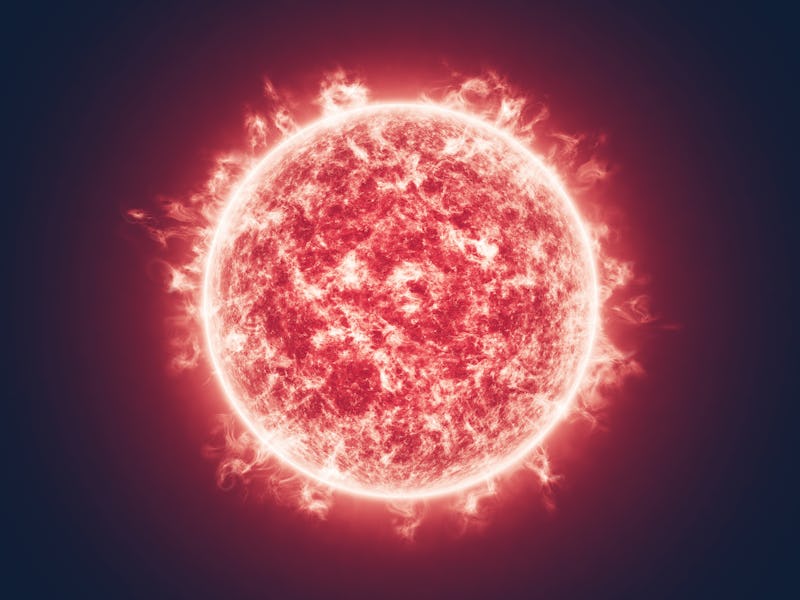How hot is the universe, really?
Turns out gravity is heating things up.

Filled with galaxies, stars, planets, dust, and gas, the cosmos is full of extreme features — extreme masses, extreme structures, and extreme features.
As scientists struggle to understand the universe we exist within, some of the most fundamental questions about the nature of the universe remain obscure. How big is it? How did it come to be?
The answers to these questions have eluded scientists for hundreds of years. But we are inching closer to answering one of them: How hot is the universe?
So, how hot is the universe?
A recent study found that the average temperature of the hot gases in the large-scale structures, including galaxies and galaxy clusters, of the universe is 2 million Kelvin — or 1,999,726.85 degrees Celsius. According to study author Ryu Makiya, a research fellow at the Kavli Institute for the Physics and Mathematics of the Universe, these gases make up the bulk of the visible matter in the universe.
"The drag is violent — so violent that more and more gas is shocked and heated up."
But it gets more complicated: Different, individual objects in the universe have different temperatures. The internal temperatures of the Sun reach 15.7 million Kelvin, according to World Science Festival. The Cosmic Microwave Background (CMB) radiation, the stuff left over from the Big Bang, is only 2.75 Kelvin, however.
How hot was the universe at the Big Bang?
Scientists believe that the temperature of the universe may have been nearly infinite at the moment of Big Bang, Claude Canizares, Distinguished Professor in Experimental Physics at MIT, tells Inverse.
“We have good reason to think the universe was extremely hot in the first infinitesimal fractions of a second of the Big Bang,” he says.
“Unlike now, the universe was probably almost completely homogeneous… and composed of a quark-gluon soup out of which protons and neutrons eventually emerged as the soup expanded and cooled," he explains.
Has the temperature of the universe changed over time?
When the universe began to rapidly expand after the Big Bang some 13.8 billion years ago, the temperature cooled dramatically and quickly.
But, as the universe became less homogenous and differentiated into the structures that are recognizable today, such as galaxies, temperature regimes throughout the universe became more diverse.
The CMB radiation, for example, dropped from 10,000 Kelvin to the contemporary 2.75 Kelvin. Collapsing gas clouds formed stars which heated up when nuclear reactions began to transpire in their interiors.
What drives temperature change in the universe?
The temperature of the CMB cooled as it expanded because the expansion process stretches out the wavelengths of the photons in the CMB. Longer wavelengths are associated with less energy, and thus, a lower temperature.
But this same expansion process created a new source of heat due to the action of gravitational forces.
The temperature of the Cosmic Microwave Background can help reveal how temperature has changed in the universe over time.
"As the Universe evolves, gravity pulls dark matter and gas in space together into galaxies and clusters of galaxies," Yi-Kuan Chiang, first author on the hot gas study and a research fellow at the Ohio State University Center for Cosmology and AstroParticle Physics, said in a statement.
"The drag is violent — so violent that more and more gas is shocked and heated up," he says.
The researchers believe that this process has been responsible for tripling the average temperature of the hot gases in the universe over the last 8 billion years.
How do researchers take the universe' temperature?
Researchers can measure the temperature of the hot gases in the large-scale structures of the universe by studying distortions in photons that travel to Earth from the CMB.
As the photons pass through hot gas, they take on some of the energy from the gas. Researchers can detect and measure this change, using it to calculate the temperature of the gases.
But a word of caution: This is not necessarily the same as knowing the temperature of everything in the universe.
What does temperature tell us about the future of the universe?
Studying the temperature of the universe is an important part cosmology. Cosmologists work to understand the origin of the universe and how it changes over time. Gaining new insights into the temperature regimes of the universe helps researchers test and develop cosmological models. This is because temperature variations can tell us something about the universe's structure.
Heat has to come from some kind of physical or energetic process. Evaluating temperature data in the context of the known laws of physics, can help researchers develop theories that best explain how the universe works.
This article was originally published on